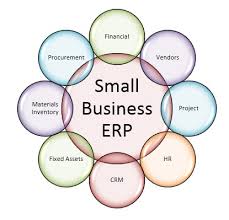Why Should Your Small Business Have an ERP
 Enterprise resource planning, best known as ERP, is a type of software that streamlines and coordinates day-to-day business processes. All the information you need to run your business is put into a database and linked to the various departments, so orders are always in sync with inventory, and production can match sales, making everything much more efficient. Obviously, this is a great thing for larger businesses, which have hundreds or thousands of orders per day. But what about the smaller businesses? Is it worth the money to invest in new software and the effort to learn it?
Enterprise resource planning, best known as ERP, is a type of software that streamlines and coordinates day-to-day business processes. All the information you need to run your business is put into a database and linked to the various departments, so orders are always in sync with inventory, and production can match sales, making everything much more efficient. Obviously, this is a great thing for larger businesses, which have hundreds or thousands of orders per day. But what about the smaller businesses? Is it worth the money to invest in new software and the effort to learn it?
No matter how big or small your business might be, a properly set-up ERP system increases productivity, lowers costs, and generally makes operations run smoother. ERP gives you an overview of everything you need to make your business go, helping you make those decisions that help your company not only to succeed, but to grow also.
Let's look at a few of the benefits an ERP can offer a small business.
Enhanced Collaboration
The same technology that allows different departments to coordinate their efforts like never before also works with individuals in a small business, creating a centralized system. You'll know immediately if something is out of stock or how much work you'll have to do for the coming day or week, because as soon as information is entered into the system, everyone who needs to know it will know it immediately.
Informed Decision Making
The best kinds of decisions are thoroughly informed ones. ERP enables you to have all the information you need available whenever you needed it. If there's going to be a shortage of something, whether raw materials or a finished product, you'll be able to see it coming and react accordingly. Incorporated budgeting software will help you better plan for any shortfalls (or windfalls) that crop up in the lifetime of your business.
Increased Productivity
This is a major benefit and reason in itself to invest in ERP. No one goes into business to lose money -- business owners want to produce something that will benefit others. When everything is put together in the same database, everyone knows exactly where the company stands at any given time. Each individual knows what they have to work with, what they need to move forward, and where to go to get what they need.
Better Inventory Management
Not only will you have instant knowledge of exactly how much stock you have at any given time, but you'll be able to track your inventory from your distributor all the way to the ultimate customer. You can categorize each product or item as you wish, with details on how much everything costs and how much it was sold for as well as where it was sold from and when it was sold. At a glance, you'll know what sells best and what needs improvement.
Enhanced Accounting
There are a thousand little expenses that eat away at your funds. ERP software helps you keep track of every last penny, so you never have to wonder where your money has gone at the end of the budgeting cycle. You’ll not only know where your money was spent, but you’ll also how efficiently it was spent and be better able to make a decision as to whether you want to continue spending money that way or move on to something more productive.
If you're still unsure, you can even make projections of expenditures you're considering to get an idea of how they'll work out before you even implement them.
Reduced Costs
This is another very important one for small businesses, which often don't have the financial cushion larger business might have. Streamlining all the information you need to run your business into one suite of applications saves money on software, and on IT in general. Every business needs technology to survive today, so it's simply more cost-effective to get an integrated system that everyone can use, no matter what their function in your business.
ERP for All Businesses of All Sizes
Naturally, it will take time and some effort to learn a new enterprise resource planning system, but that's true for everything new. You'll have to enter all the relevant information so your new system knows what to keep track of and what aspects of the business are important to you. But once it's up and running, you'll probably wonder how you ever got along without it.
Lower overhead, intuitive interfaces, instant inventory management, enhanced accounting, and more -- ERP is a business enhancement solution that can benefit any business, whether it has five or five thousand employees.
Emily Hunter has been writing about business topics for many years, and currently writes on behalf of the ERP software vendors at TGO Consulting. In her spare time, she cheers for Carolina Crown, formulates her own sodas, and crushes tower defense games. Follow her on Twitter at @Emily2Zen

 Delicious
Delicious Digg
Digg StumbleUpon
StumbleUpon Propeller
Propeller Reddit
Reddit Magnoliacom
Magnoliacom Newsvine
Newsvine
Comments
Post new comment